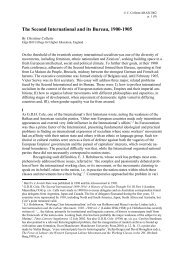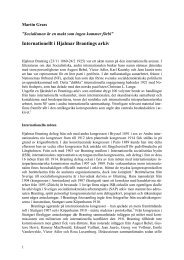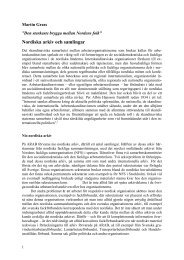Communism, Social Democracy and the Democracy Gap
Communism, Social Democracy and the Democracy Gap
Communism, Social Democracy and the Democracy Gap
Create successful ePaper yourself
Turn your PDF publications into a flip-book with our unique Google optimized e-Paper software.
© S. Berger/ARAB 2002<br />
p. 11 (14)<br />
sections of <strong>the</strong> population. Instead it relied on centralised bureaucracies which stifled<br />
innovation <strong>and</strong> wasted human <strong>and</strong> natural resources on a gr<strong>and</strong> scale. By comparison<br />
<strong>Social</strong> <strong>Democracy</strong> has been a remarkable success story. Western Europe changed<br />
fundamentally over <strong>the</strong> course of <strong>the</strong> 20 th century. <strong>Social</strong> Democratic principles of<br />
equality, welfare <strong>and</strong> state intervention in markets helped to make it a better place for <strong>the</strong><br />
overwhelming majority of <strong>the</strong> population. Outrageous inequalities of consumption still<br />
exist, but even <strong>the</strong> poorer section of <strong>the</strong> population have been given access to resources to<br />
a hi<strong>the</strong>rto unprecedented degree. The <strong>Social</strong> Democratisation of West-European politics<br />
came to a crushing halt in <strong>the</strong> 1980s. Neo-liberalism swept everything before it <strong>and</strong><br />
portrayed three of <strong>the</strong> four pillars of <strong>the</strong> old <strong>Social</strong> Democratic self-underst<strong>and</strong>ing as key<br />
evils which had caused <strong>the</strong> economic crisis of <strong>the</strong> 1970s: statism, Keynesian economics<br />
<strong>and</strong> <strong>the</strong> welfare state now all stood condemned. The only pillar which was left largely<br />
intact was <strong>the</strong> commitment of <strong>Social</strong> <strong>Democracy</strong> to democracy. <strong>Democracy</strong> seemed<br />
indeed, in <strong>the</strong> words of Paul Hirst, 'socialism's best reply to <strong>the</strong> right'. 45 But a statement<br />
such as this only brings us full circle <strong>and</strong> returns us to <strong>the</strong> question: which democracy<br />
At <strong>the</strong> beginning of <strong>the</strong> 21 st century <strong>the</strong> project of democracy needs rethinking. In<br />
<strong>the</strong> 1990s <strong>the</strong>re was much talk about growing disillusionment of voters with political<br />
parties which found expression in lower <strong>and</strong> lower participation rates in elections.<br />
Increasing numbers of citizens withdrew even from <strong>the</strong> limited sphere in which <strong>the</strong>y had<br />
previously been active: <strong>the</strong> ballot box. Their passivity seemed to threaten <strong>the</strong> legitimacy of<br />
representative democracies. Arguably this development was also related to <strong>the</strong> onesidedness<br />
of <strong>the</strong> <strong>Social</strong> Democratic concern with providing <strong>the</strong> citizens with adequate<br />
resources <strong>and</strong> protecting <strong>the</strong>m from <strong>the</strong> vagaries of <strong>the</strong> market. Such statist policies<br />
imposed both rights <strong>and</strong> duties on passive citizens <strong>and</strong> produced a state-directive<br />
collectivism. Politics <strong>and</strong> political processes became increasingly removed from <strong>the</strong><br />
eveyday lives of citizens. They were hardly involved in <strong>the</strong> systems of institutions meant<br />
to ensure protection agains arbitrary rule. If freedom has to be institutionalised, arguably it<br />
is institutionalised too much today. Power has been carried out too much on behalf of<br />
citizens ra<strong>the</strong>r than by <strong>the</strong>m. In fact, an activation <strong>and</strong> politicisation of citizens was often<br />
explicitly avoided, as high levels of politicisation were perceived as dangerous for<br />
political stability. Joseph Schumpeter, in his influential exploration of <strong>the</strong> relationship<br />
between capitalism, socialism <strong>and</strong> democracy of 1942 argued that people tended to act<br />
irrationally. They could not be trusted to make rational, or, for that matter, moral<br />
choices. 46 A fugititive from European fascism, Schumpeter felt attracted to <strong>the</strong>ories of<br />
crowd psychology, <strong>and</strong> <strong>the</strong> victory of fascism in many European states in <strong>the</strong> inter-war<br />
period cast a long shadow over democratic <strong>the</strong>ories in <strong>the</strong> post-war era. To many, like<br />
Schumpeter, it seemed best to leave politics to <strong>the</strong> reasonable democratic elites. The<br />
people were asked nothing more than to vote every couple of years.<br />
Arguably <strong>the</strong> expansion of citizenship rights pushed forward by <strong>Social</strong> <strong>Democracy</strong><br />
throughout <strong>the</strong> twentieth century did not always include <strong>the</strong> propagation of more active<br />
forms of citizenship. In <strong>the</strong> 1960s <strong>and</strong> 1970s some on <strong>the</strong> left had already argued that <strong>the</strong><br />
representative democracies in <strong>the</strong> West resembled 'thin democracies'. 47 Today <strong>the</strong>se<br />
democracies are in need of addressing <strong>the</strong> crucial question of how to engender a more<br />
active sense of citizenship in its populations. Citizenship has to become less of a status<br />
<strong>and</strong> more of an active practice <strong>and</strong> experience. Yet citizens have to be made: <strong>the</strong>y need<br />
45 Paul Hirst, '<strong>Democracy</strong>: <strong>Social</strong>ism's Best Reply to <strong>the</strong> Right', in: Barry Hindess (ed.), Reactions to <strong>the</strong><br />
Right (London 1990), p. 161.<br />
46 Joseph Schumpter, Capitalism, <strong>Social</strong>ism <strong>and</strong> <strong>Democracy</strong> (New York 1942).<br />
47 Benjamin R. Barber, Strong <strong>Democracy</strong>: Participatory Politics for a New Age (Berkeley 1984); see also<br />
Philip Green, Retrieving <strong>Democracy</strong> (London 1985).
















